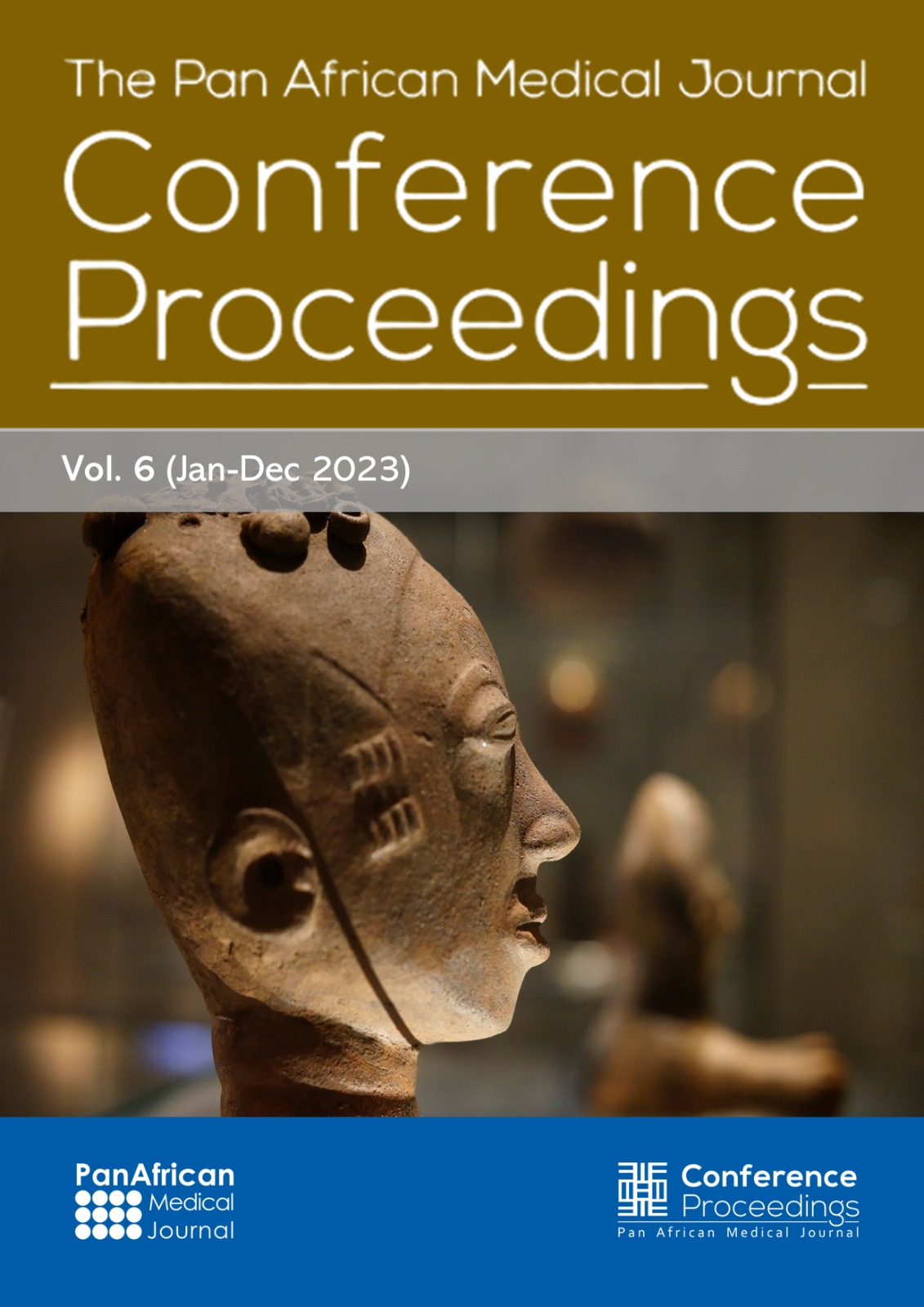Conference abstract
Restorative role of solanum torvum swartz. (solanaceae) leaves´ extract in plasmodium berghei induced liver and kidney damage in rats
Pan African Medical Journal - Conference Proceedings. 2023:18(84).03
Oct 2023.
doi: 10.11604/pamj-cp.2023.18.84.2038
Archived on: 03 Oct 2023
Contact the corresponding author
Keywords: Malaria, Solanum torvum, liver, kidney, toxicity
Poster
Restorative role of solanum torvum swartz. (solanaceae) leaves´ extract in plasmodium berghei induced liver and kidney damage in rats
Ngwem Tenlep Loïc1,&, Gounoue Kamkumo Raceline1
1Université de Yaoundé 1, Yaoundé, Cameroun
&Corresponding author
Introduction: damage to liver and kidney functions is a major problem concern occurring in people living in the malaria-endemic zone. The causes of the diseases are multifactorial including malaria complications. The control of these pathologies faces difficulties which leads the population to seek alternative treatment in natural resources as phytotherapy. The aim was to evaluate the effects of the extract on the alterations of the hepatic and renal functions induced by chronic malaria.
Methods: rats were infected by inoculation with 0.5 mL of red blood cells parasitised. Infected animals were followed-up for 21 days parasitaemia was monitored. Retro-orbital blood collection based on some biomarker parameters analysis was done. Sicked animals were divided into 7 groups of 5 animals each and treated with the extract, silymarine, combination (of chloroquine and Silymarine), and distilled water for negative control. A batch of 5 healthy rats receiving distilled water was added and considered as normal are the treatment was administrated at a single daily dose for 14 days. Hematological and biochemical analysis, oxidative stress, and histopathological analysis
Results: after 21 days led to a significant increase in ALT, AST, creatinine, ALP, bilirubin, Urea, and K+ in untreated animals. Likewise, the infection induced significant hypoproteinemia, anemia, and decreased antioxidant species with alteration of the microarchitecture of liver and kidney tissues. The treatment with the plant extract significantly restored most of these parameters and tissue microarchitecture.
Conclusion: these results demonstrate that the aqueous extract of S. torvum possesses hepatic and renal restorative properties against malaria infection.
Restorative role of solanum torvum swartz. (solanaceae) leaves´ extract in plasmodium berghei induced liver and kidney damage in rats
Ngwem Tenlep Loïc1,&, Gounoue Kamkumo Raceline1
1Université de Yaoundé 1, Yaoundé, Cameroun
&Corresponding author
Introduction: damage to liver and kidney functions is a major problem concern occurring in people living in the malaria-endemic zone. The causes of the diseases are multifactorial including malaria complications. The control of these pathologies faces difficulties which leads the population to seek alternative treatment in natural resources as phytotherapy. The aim was to evaluate the effects of the extract on the alterations of the hepatic and renal functions induced by chronic malaria.
Methods: rats were infected by inoculation with 0.5 mL of red blood cells parasitised. Infected animals were followed-up for 21 days parasitaemia was monitored. Retro-orbital blood collection based on some biomarker parameters analysis was done. Sicked animals were divided into 7 groups of 5 animals each and treated with the extract, silymarine, combination (of chloroquine and Silymarine), and distilled water for negative control. A batch of 5 healthy rats receiving distilled water was added and considered as normal are the treatment was administrated at a single daily dose for 14 days. Hematological and biochemical analysis, oxidative stress, and histopathological analysis
Results: after 21 days led to a significant increase in ALT, AST, creatinine, ALP, bilirubin, Urea, and K+ in untreated animals. Likewise, the infection induced significant hypoproteinemia, anemia, and decreased antioxidant species with alteration of the microarchitecture of liver and kidney tissues. The treatment with the plant extract significantly restored most of these parameters and tissue microarchitecture.
Conclusion: these results demonstrate that the aqueous extract of S. torvum possesses hepatic and renal restorative properties against malaria infection.








